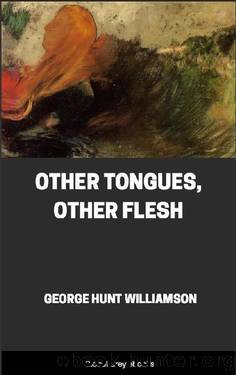Other Tongues, Other Flesh by George Hunt Williamson

Author:George Hunt Williamson [Williamson, George Hunt]
Language: eng
Format: epub
Publisher: Global Grey ebooks
Published: 2018-11-28T00:00:00+00:00
Its branches reach into heaven, it roots into hela, the caverns of darkness.
Early in 1952, a strange young man appeared in California. He lectured on the coming of the space people to earth. He always spoke to small groups of students or clubs. There was nothing unusual about him except that he wore a lapel button on which was a distinctive symbol. (See Plate XV). Here we see the familiar swastika of the Four Forces and a serpent twined about a wand or rod. This is similar to the caduceus, a magic herald's wand, a sacred rod having power over wealth, prosperity, happiness, and dreams, carried by the messengers of the Greek gods, especially by Hermes. The caduceus was a sign of the settlement of quarrels, carried by heralds and ambassadors. This symbol is also used for Apollo.
The serpent and the staff are symbols of Aesculapius, Roman god of medicine and Asklepios, Greek god of healing. The staff represented this god's wanderings from place to place dispensing cures.
"Yea, though I walk through the valley of the shadow of death, I will fear no evil: for thou art with me; thy rod and thy staff they comfort me." (Psalms 23:4).
Since Apollo, Hermes, Osiris, and others were undoubtedly nothing but space visitors in ancient times who later were defied by the people, we would expect their symbols to be used yet by modern space visitors. The attributes or actions of Apollo or Hermes as space men were carried over to fit the later gods Apollo, Hermes, etc. The space men came to settle disputes and the caduceus became a sign of "the settlement of quarrels". It was carried by "heralds and ambassadors"--indeed space visitors were heralds of a new wisdom and knowledge and ambassadors of the worlds. The rod or staff represented the god of healing's "wanderings". And, the space visitors were "healers" of man's sufferings; they did wander from "place to place dispensing cures" for the "sorrowful planet Earth. The "rod" and the "staff" did "comfort" the people of the ancient world when it was visited by intelligences of other realms in outer space.
The description that has come down to us of Apollo fits him in his role of spaceman: "He was the god of pure light, the enemy of darkness, healer, preserver. He always declared truth; but the limited mind of man cannot always grasp the meaning of his sayings."
Likewise, the same is true of Osiris: "Osiris, reigning as a king on earth, reclaimed the Egyptians from savagery, gave them laws, and taught them worship. He introduced the cultivation of grains. Eager to communicate his discoveries to all mankind he travelled over the world, diffusing the blessings of civilization and agriculture wherever he went."
The Elder Brother clearly showed his position as Head of the Wandering Host when he said: "Ye are from beneath; I am from above: ye are of this world." (St. John 8:23).
In Christ's Prayer of Consecration he refers to The Wanderers: "I have given them thy word; and the world hath hated them, because they are not of the world, even as I am not of the world.
Download
This site does not store any files on its server. We only index and link to content provided by other sites. Please contact the content providers to delete copyright contents if any and email us, we'll remove relevant links or contents immediately.
| Aeronautics & Astronautics | Astronomy |
| Astrophysics & Space Science | Comets, Meteors & Asteroids |
| Cosmology | Mars |
| Solar System | Star-Gazing |
| Telescopes | UFOs |
Tools of Titans by Timothy Ferriss(8346)
Turbulence by E. J. Noyes(8001)
Secrets of Antigravity Propulsion: Tesla, UFOs, and Classified Aerospace Technology by Ph.D. Paul A. Laviolette(5358)
Astrophysics for People in a Hurry by Neil DeGrasse Tyson(5169)
Room 212 by Kate Stewart(5090)
Design of Trajectory Optimization Approach for Space Maneuver Vehicle Skip Entry Problems by Runqi Chai & Al Savvaris & Antonios Tsourdos & Senchun Chai(5055)
Pale Blue Dot by Carl Sagan(4982)
The David Icke Guide to the Global Conspiracy (and how to end it) by David Icke(4684)
A Journey Through Divination and Astronomy by Publishing Pottermore(4370)
Goodbye Paradise(3790)
Apollo 8 by Jeffrey Kluger(3689)
COSMOS by Carl Sagan(3603)
The Five People You Meet in Heaven by Mitch Albom(3544)
Losing the Nobel Prize by Brian Keating(3527)
How to Read Water: Clues and Patterns from Puddles to the Sea (Natural Navigation) by Tristan Gooley(3448)
Brief Answers to the Big Questions by Stephen Hawking(3411)
How to Read Nature by Tristan Gooley(3315)
The Order of Time by Carlo Rovelli(3174)
A Brief History of Time by Stephen Hawking(3009)
